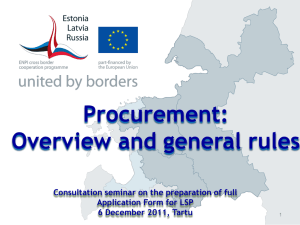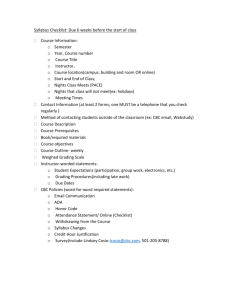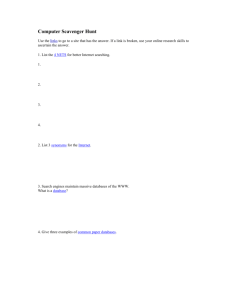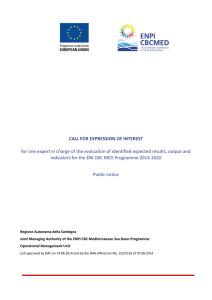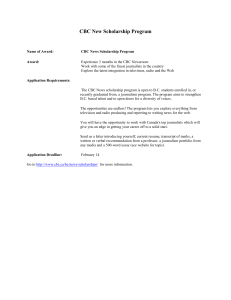Annotated Glossary and Acronyms
advertisement
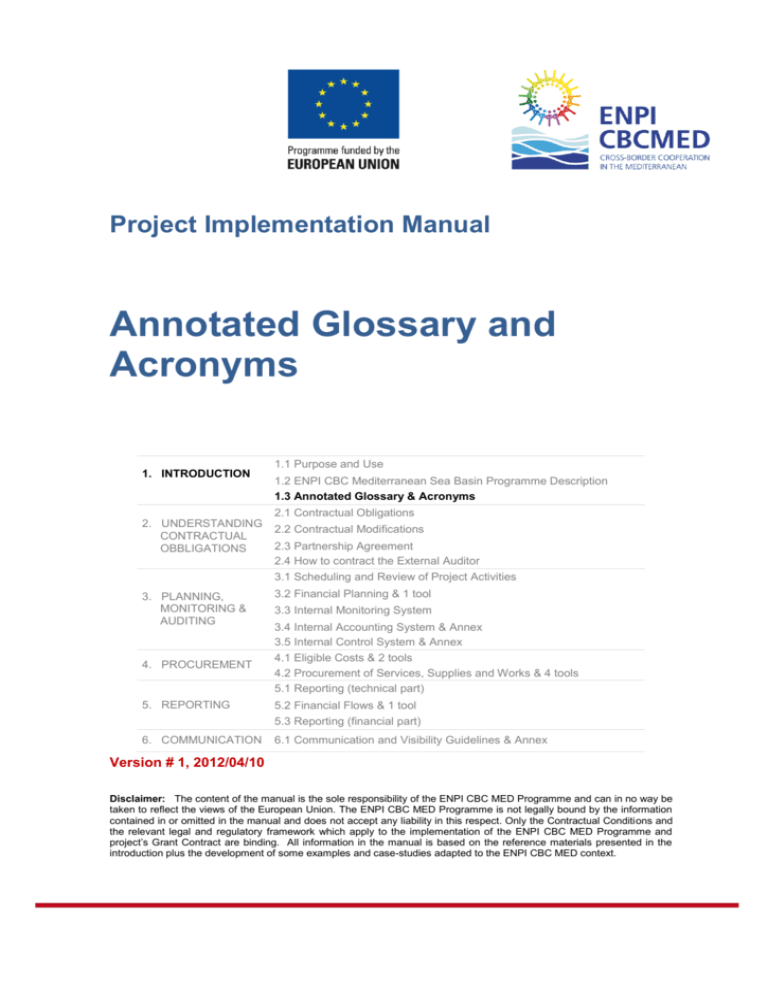
Project Implementation Manual Annotated Glossary and Acronyms 1.1 Purpose and Use 1. INTRODUCTION 1.2 ENPI CBC Mediterranean Sea Basin Programme Description 1.3 Annotated Glossary & Acronyms 2.1 Contractual Obligations 2. UNDERSTANDING CONTRACTUAL OBBLIGATIONS 3. PLANNING, MONITORING & AUDITING 4. PROCUREMENT 5. REPORTING 2.2 Contractual Modifications 2.3 Partnership Agreement 2.4 How to contract the External Auditor 3.1 Scheduling and Review of Project Activities 3.2 Financial Planning & 1 tool 3.3 Internal Monitoring System 3.4 Internal Accounting System & Annex 3.5 Internal Control System & Annex 4.1 Eligible Costs & 2 tools 4.2 Procurement of Services, Supplies and Works & 4 tools 5.1 Reporting (technical part) 5.2 Financial Flows & 1 tool 5.3 Reporting (financial part) 6. COMMUNICATION 6.1 Communication and Visibility Guidelines & Annex Version # 1, 2012/04/10 Disclaimer: The content of the manual is the sole responsibility of the ENPI CBC MED Programme and can in no way be taken to reflect the views of the European Union. The ENPI CBC MED Programme is not legally bound by the information contained in or omitted in the manual and does not accept any liability in this respect. Only the Contractual Conditions and the relevant legal and regulatory framework which apply to the implementation of the ENPI CBC MED Programme and project’s Grant Contract are binding. All information in the manual is based on the reference materials presented in the introduction plus the development of some examples and case-studies adapted to the ENPI CBC MED context. Term Acronym Description Accounting system The systematic recording, reporting and analysis of the financial transactions of a project or an entity. Action PraG term equivalent to “project”. Activities Tasks that have to be carried out to produce project results. Addendum Document annexed to the Grant Contract to formalize an amendment. Article 9.1 of the General Conditions of the Grant Contract indicates that “Any amendment to the Contract, including the Annexes thereto, must be set out in writing in an addendum.” Not all changes need an addendum. Adjoining region In the ENPI CBC MED Programme is a territory bordering the regions that are central to the Programme. Partners and associates from the adjoining regions can participate to the implementation of the projects. The ENPI CBC MED adjoining regions are: Egypt (Al Gharbiyah, Al Minufiyah, Al Qalyubiyah, As Suways), France (Rhône‐Alpes, Auvergne, Midi‐Pyrénées), Greece (Dytiki Makedonia), Italy (Molise, Abruzzo, Marche, Umbria, Emilia Romagna, Piemonte), Jordan (Al‐Mafraq, Ma’an, Amman, Ajlun, Jarash, Az Zarqa’, Portugal (Alentejo), Spain (Extremadura, Castilla La Mancha, Aragon), Syria (Hama, Idlib, Homs), Tunisia (Tataoune, Kebili, Gasfa, Sidi Bouzid, Kairouan, Zaghouan, Manouba, Le Kef, Siliana). See also cooperation area and eligible regions. Administrative costs A fixed percentage of the total amount of direct eligible costs (excluding taxes) of the Action may be claimed as indirect costs to cover the administrative overheads incurred by the Beneficiary or Partners. This should not exceed the percentage laid down in article 3 of the Special Conditions of the Grant Contract. Agreed upon procedures Procedures agreed with the Auditor which refer to the expenditure verification report accompanying the request by Beneficiaries for payment of the grant. The model can be found in Annex VII of the Grant Contract and it will be part of the Auditor contract. Antenna See Branch Office Applicant The organisation which submits a project proposal for selection on behalf of a group of Partners (see also Beneficiary). Grant GAF Annotated Glossary & Acronyms Form used by Applicants to request the award of a grant. It 2/17 Term Acronym Application Form Description includes a description of the Project, and the budget which later become annexes to the Grant Contract. The logical framework is used for monitoring purposes and evaluate the logic of intervention. Associate / Associate Partners Organisations which have an important role in the project but may not receive funding from the grant with the exception of subsistence or travel costs for project activities. Associates do not have to meet the eligibility criteria for Applicants and Partners. Assumptions External factors which could affect the progress or success of the project, but over which the project manager has no direct control. Audit Verification of the Beneficiary/Partner accounts, including the project accounts. It is carried out either by JMA, the European Commission, the European Court of Auditors or an external auditor on their behalf. It is NOT the expenditure verification to be attached by the Beneficiary to the requests for payment. Auditor Professional responsible for carrying out the Expenditure Verification for Beneficiaries and Partners (see “controller”). If engaged by programme bodies or EC, s/he is the responsible for carrying out any audit on their behalf. Amendment Any modification to the contract documents that may lead to the approval and signature of an addendum. Beneficiary The Applicant becomes Beneficiary when the grant is awarded. The Beneficiary is the organisation which signs the Grant Contract with JMA on behalf of the project Partners. Beneficiaries Those who will benefit from the action in the long term at the level of the society or sector at large. They can be classified as direct or indirect beneficiaries in function of the relationship to the action. Body governed by public law A body governed by public law is a body: (i) established for the specific purpose of meeting needs in the general interest, not having an industrial or commercial character, and (ii) having a legal personality, and (iii) is financed, for the most part, by the State, Regional or Local authorities, or other bodies governed by public law; or subject to management supervision by those bodies; or having an administrative, managerial or supervisory board, more than half of whose members are appointed by the State, Annotated Glossary & Acronyms 3/17 Term Acronym Description regional or local authorities, or other bodies governed by public law. Branch Office Programme body established by JTS to support Applicants, Beneficiaries and Partners by informing them of activities planned under the programme, as defined in article 16 of the Implementing Rules. Call for proposals An award procedure for grants published by the Contracting Authority allowing potential Applicants and Partners to submit proposals. It may be open or restricted. Call for tenders An open award procedure for contracts (services, works or supplies), published by the contracting authority. In case of tenders launched within a project, this is the Beneficiary or Partners. Capitalisation The process of gathering and analysis of best practices and lessons learnt and the systematic management of the knowledge gained with the aim of making the results and findings available for all concerned actors by means of specific tools/events of communication. In the specific policy domain of cross-border cooperation on the EU’s external borders, one of the expected results of the capitalisation is the transfer of the good practices identified to other cross-border cooperation projects or programmes. Cash flow Transfer of money into and out of an organization. Co-financing Co-funding is the funding which matches the EC contribution to the project. Participation of beneficiaries is a principle of all grants allocated by EuropeAid as a measure of sustainability of project’s activities. Co-financing is regulated by article 19 of the Implementing Rules. Committee on Sponsoring Organisations of the Treadway Commission COSO International body having defined the most widely accepted framework for internal control in organisations. Contingency Reserve The contingency reserve is a part of the project budget that can be used in case of unforeseeable events, with prior approval of the JMA. Article 14.3 of the General Conditions of the Grant Contract defined it. Conflict of interest Conflict of interest occurs when the impartial and objective exercise of the functions of an institution, or the respect of the principles of competition, non-discrimination or equality Annotated Glossary & Acronyms 4/17 Term Acronym Description of treatment of candidates/ tenderers /applicants/contractors with regard to the award procedure or contract, is compromised for reasons involving family, emotional life, political or national affinity, economic interest or any other shared interest with the Beneficiary of EU funded programmes. For more details please see section 2.3.6 of PraG. Contract award procedure The procedure followed by a Contracting Authority to identify, and conclude a contract with, a suitable contractor to provide defined goods or services. Contracting Authority The usual PraG term for the institution responsible for awarding and contracting grants. In the context of ENPI CBC MED, it is sometimes the Joint Monitoring Committee (when deciding on the award on grants) or the Joint Managing Authority (signing the contracts with Beneficiaries) or the Beneficiaries or Partners (when conducting tenders for services, supplies or works). Contractual conditions Terms and conditions that set the rights and obligations of the contracting parties, when a contract is awarded or entered into force. In the case of the ENPI CBC MED Programme, these include “general conditions” which are common to all types of contracts, as well as “special conditions” which are peculiar to each specific project. Contractual modifications Written change to a contract. A contract modification may introduce or cancel specifications or terms of an existing contract, while leaving intact its overall purpose and effect. Contractual modification are regulated by article 9 of the General Conditions of the Grant Contract as modified by article 7.4.2 of the Special Conditions (see also Amendment and Addendum). Controller Public officer designated by some Member States to perform the auditor’s tasks for project expenditure verification. Controls Financial verifications carried out by JMA, EC or other authorised bodies in order to protect the financial interest of the European Union against fraud and other irregularities. Cooperation area The area where the ENPI CBC MED Programme is promoting its main goals. The Programme’s eligible area is composed by territories belonging to 7 EU Member states (Cyprus, France, Greece, Italy, Malta, Portugal, Spain) and 7 Mediterranean Partner Countries (Egypt, Israel, Jordan, Lebanon, Occupied territories of Palestine, Syria and Annotated Glossary & Acronyms 5/17 Term Acronym Description Tunisia). Cut-off Audit and contract term to define the date of the beginning or end of eligibility of expenditure. Derogation The exceptional non-compliance with a certain rule or legal requirement. The derogation has to be authorised by the relevant competent authority. Development and Cooperation – EuropeAid EuropeAid is a new Directorate–General responsible for designing EU development policies and delivering aid through programmes and projects across the world and coordinating activities concerning the ENP. Direct Costs Described in article 14 of the General Conditions of the Grant Contract. They are costs not based on a flat rate. They are identifiable in the accounting and verifiable through adequate supporting documents. Double entry bookkeeping Accounting technique which records each transaction in at least two different accounts, as a credit and as a debit. Credit entries represent the sources of financing, while debit entries the use of this financing. It is compulsory in ENPI CBC MED, as indicated in article 16 of the General Conditions of the Grant Contract (see also simple entry bookkeeping). Economy (principle of) Assurance that the resources used by a Beneficiary or Partner for pursuit of its activities shall be made available in due time, in appropriate quantity and quality and at the best price, as defined in article 27 of the Financial Regulation. Effectiveness Attaining the specific objective set and achieving the intended results of a project, as defined in article 27 of the Financial Regulation. Efficiency Best relationship between resources employed and results achieved, as defined in article 27 of the Financial Regulation. Eligible regions For the ENPI CBC MED Programme the eligible regions are the main cooperation area and are representing 14 countries: Cyprus (the whole country), Egypt (Marsa Matruh, Al Iskandanyah, Al Buhayrah, Kafr ash Shaykh, Ad Daqahliyah, Dumyat, Ash Sharquiyah, Al Isma’iliyah, Bur Sa’id), France (Corse, Languedoc‐Roussillon, Provence‐Alpes‐Côte d’Azur), Greece (Anatoliki Makedonia ‐ Thraki, Kentriki Makedonia, Thessalia, Ipeiros, Ionia Nisia, Dytiki Ellada, Sterea Ellada, Peloponnisos, Attiki, Voreio Aigaio, Notio Aigaio, Kriti), Israel (the whole country), Italy Annotated Glossary & Acronyms 6/17 Term Acronym Description (Basilicata, Calabria, Campania, Lazio, Liguria, Puglia, Sardegna, Sicilia, Toscana), Jordan (Irbid, Al‐Balga, Madaba, Al‐Karak, Al‐Trafila, Al‐Aqaba), Lebanon (the whole country), Malta (the whole country), OPT (the whole country), Portugal (Algarve) Spain (Andalucía, Cataluña, Comunidad Valenciana, Murcia, Islas Baleares, Ceuta, Melilla), Syria (Latakia, Tartous), Tunisia (Médenine, Gabès, Sfax, Mahdia, Monastir, Sousse, Nabeul, Ben Arous, Tunis, Ariana, Bizerte, Béja, Jendouba). Eligible costs Costs actually incurred by a Beneficiary or a Partner which meet the criteria described in article 14 of General Conditions of the Grant Contract. Eligibility criteria The conditions under which a cost, a Partner, a tender bid, etc. can be accepted as such during a selection procedure or in a financial report for the calculation of a grant. European Anti-fraud Office European Commission European Court of Auditors European Economic Area European Neighbourhood Policy OLAF EC body responsible for investigation when there is suspicion of fraud. EC The European Commission is the executive body of the European Union. The body is responsible for proposing legislation, implementing decisions, upholding the Union's treaties and the general day-to-day running of the European Union. (http://ec.europa.eu/index_en.htm) ECA The European Court of Auditors is the EU Institution established to audit the accounts of EU finances. The primary role of the ECA is to externally check if the funds of the EU have been spent legally and with sound management. (http://eca.europa.eu/portal/page/portal/eca_main_pages/h ome) EEA The EEA unites the 27 EU Member States and the three EEA EFTA States (Iceland, Liechtenstein and Norway) into an Internal Market governed by the same basic rules. These rules aim to enable goods, services, capital, and persons to move freely within the EEA in an open and competitive environment. (http://www.efta.int/eea.aspx) ENP Since its enlargement in 2003, the EU identified as a priority the reinforcement of relationships with its neighbour countries. The European Neighbourhood Policy Strategy Paper (COM/2004 373 final) sets out in concrete terms how the EU proposes to work more closely with neighbour countries. Annotated Glossary & Acronyms 7/17 Term Acronym Description (http://ec.europa.eu/world/enp/index_en.htm) European Neighbourhood and Partnership Instrument European Neighbourhood and Partnership Instrument Cross Border Cooperation ENPI The financing instrument for the European Neighbourhood Policy and the EU’s Strategic Partnership. It is designed to target sustainable development and approximation to EU policies and standards according to the agreed priorities in the ENP Action Plans and the Strategic Partnership. (http://ec.europa.eu/world/enp/funding_en.htm) ENPI CBC Cross Border Cooperation (CBC) is a key priority of the European Neighbourhood and Partnership Instrument (ENPI). It aims to reinforce cooperation between Member States and Partner Countries along the external borders of the European Union. (http://ec.europa.eu/europeaid/where/neighbourhood/regio nal-cooperation/enpi-cross-border/index_en.htm) ENPI CBC Implementing rules COMMISSION REGULATION (EC) No 951/2007 of 9 August 2007 laying down implementing rules for crossborder cooperation programmes financed under Regulation (EC) No 1638/2006 of the European Parliament and of the Council laying down general provisions establishing a European Neighbourhood and Partnership Instrument. (http://eur-lex.europa.eu/LexUriServ/ LexUriServ.do?uri=OJ:L:2007:210:0010:0025:EN:PDF) ENPI Regulation Regulation (EC) No 1638/2006 of the European Parliament and of the Council of 24 October 2006 laying down general provisions establishing a European Neighbourhood and Partnership Instrument (http://ec.europa.eu/europeaid/where/neighbourhood/regio nal-cooperation/enpi-crossborder/documents/enpi_regulation_en.pdf) ENPI CrossBorder Cooperation Strategy Paper 2007-2013 European Neighbourhood and Partnership Instrument Cross-Border Cooperation Strategy Paper 2007-2013 which gives the strategic framework for EC support for cross-border cooperation on the external borders of the European Union, under the ENPI in 2007-13, with an Indicative Programme for 2007-10 (http://ec.europa.eu/europeaid/ where/neighbourhood/regional-cooperation/enpi-crossborder/ documents/enpi_cbc_sp_ip_20072013_final_en.pdf) ENPI CBC Mediterranean Basin ENPI CBC MED Annotated Glossary & Acronyms The Operational Programme, approved on August 14th 2008 by European Commission decision C (2008) 4242, establishes a strategic framework of 4 Priorities, jointly 8/17 Term Acronym Programme Description defined by the participating countries, based on common objectives and principles. (http://www.enpicbcmed.eu/en/index.php?xsl=866&s=29&v =9&c=6088&na=1&n=10). Execution period Period going from the start of project implementation until the moment when the final balance payment of the grant is made or, at the latest, 18 months after the end of the implementation period. Expenditure verification A report on the verification of project expenditure, produced by an approved auditor who meets the specific conditions of the Terms of Reference for expenditure verification (Annex VII of the Grant Contract). This external verification of the expenditure has to accompany any payment request (except the first pre-financing request made on contract signature).The subject of the expenditure verification is the financial report produced by Beneficiaries and Partners. Evaluation Independent assessment of the achievement of the project objectives and the respect of the principles of efficiency and effectiveness. It may be carried out at the project’s own initiative, but also at the initiative of the JMA or the EC. Gantt Chart A method of presenting information graphically, often used for activity scheduling. Similar to a bar chart. Impact The effect of the project on its wider environment, and its contribution to the wider sector objectives summarised in the project’s general objective, and on the achievement of the overarching policy objectives of the EC. Implementation period Period going from the start until the end of the project activities. Indicators see Objectively Verifiable Indicators Indirect costs See Administrative costs Inforeuro Official EC web site for currency exchange rate for the Euro.http://ec.europa.eu/budget/inforeuro/index.cfm?Langu age=en In kind contribution Contribution to project activities which does not involve cash expenditure by Beneficiaries and Partners, such as voluntary work or the free use of premises. It is non-eligible as indicated in article 14.5 of the General Conditions of the Grant Contract Instrument for Pre-Accession IPA Annotated Glossary & Acronyms EU financial instrument (2007-2013) supporting the countries engaged in the accession process to become EU 9/17 Term Acronym Description Member States, such as Turkey. INTERACT ENPI INTERACT ENPI is an EU project which supports the management and implementation of the ENPI CBC programmes established along the EU's Eastern and Southern external borders. (http://www.interact-eu.net/ interact_enpi/interact_enpi/122/562) Interim report Narrative and financial report accompanying a request for pre-financing from the Beneficiary to the JMA. Intervention Logic The strategy underlying the project. It is the narrative description of the project at each of the four levels of the “hierarchy of objectives” used in the Logical Framework. Irregularity Any infringement of a provision of Community law resulting from an act or omission by a Beneficiary or Partner which has, or would have, the effect of prejudicing the general budget of the EU by charging an unjustified item of expenditure. Final Beneficiaries Those who will benefit from the action in the long term at the level of the society or sector at large, as defined in the PraG application form template. Final report Narrative and financial report accompanying a request from the Beneficiary for balance payment of the grant by the JMA. Financial Regulation Council Regulation (EC, Euratom) No 1605/2002 of 25 June 2002 on the Financial Regulation applicable to the general budget of the European Communities. (http://eurlex.europa.eu/LexUriServ/ LexUriServ.do?uri=CONSLEG:2002R1605:20071227:EN:P DF) Financial Report Part of the Interim Report or final report indicating the amount of eligible expenditure incurred and paid by the Beneficiary and the Partners. Financing Agreements Agreement established between the European Commission and each Partner Country for each Joint Operational Programme, in accordance with article 10 of the Implementing Rules Fraud Deliberate deception, trickery or cheating intended to gain an advantage. General objective It explains why the project is important to society, (also sometimes known as the ‘Goal’) in terms of the longer-term benefits to final beneficiaries and the wider benefits to other Annotated Glossary & Acronyms 10/17 Term Acronym Description groups. It also helps to show how the project fits into the priorities of the programme. The project contributes to the achievement of the general objective but it will not be achieved by the project alone. General conditions The general contractual provisions setting out the administrative, financial, legal and technical clauses governing the execution of all contracts of a particular type. In the ENPI CBC MED Programme is represented by Annex II of the Grant Contract, and describes the conditions applicable to all projects financed by EU grants for external actions. Grant A direct financial contribution, by way of donation from the EU budget, in order to finance a project intended to help achieve an objective that is part of a European Union policy. Grant Contract Legally binding agreement signed between the JMA and the Beneficiary laying out the terms and conditions for project implementation. Implementing Rules Commission Regulation EC 951/2007 laying down implementing rules for Cross-Border Cooperation programmes financed under Regulation (EC) No 1638/2006 of the European Parliament and of the Council laying down general provisions establishing a European Neighbourhood and Partnership Instrument (http://eurlex.europa.eu/LexUriServ/ LexUriServ.do?uri=OJ:L:2007:210:0010:0025:EN:PDF) Internal control A system designed to promote efficiency or to assure the implementation of a policy, the safeguard of assets or to avoid fraud and error. Joint Managing Authority JMA The body entrusted by the participating countries of a programme with the tasks involved in the implementation of the programme, in accordance with article 14 of the Implementing Rules JMC The highest decision-making body of a programme, with representation from all participating countries, in accordance with articles 11 to 13 of the Implementing Rules. JOP Strategic document jointly developed by the participating countries of a programme area, as defined in the Strategy Paper. It is approved by a Decision of the European Commission. Joint Monitoring Committee Joint Operational Programme Annotated Glossary & Acronyms 11/17 Term Acronym Description Joint Technical Secretariat JTS The JTS is a body established by JMA to assist in the dayto-day management of the activities of the programme, in accordance with article 16 of the Implementing Rules, Kick-off meeting A meeting at the beginning of the project to align peoples' understanding of project objectives, procedures and plans, and to begin the team-building process. A kick-off meeting is typically a workshop type meeting and it may last from 1 to 3 days. It generally include several activities such as revision of activities planning, Organize the project governance (responsibilities), define a communication plan, share information and experience concerning implementing rules. Lead Partner See Beneficiary Logical framework (logframe) Logical Framework Approach LF The matrix in which the project Intervention Logic, Assumptions, Objectively Verifiable Indicators and Sources of Verification are presented. LFA A methodology for planning, managing and evaluating programmes and projects, involving stakeholder analysis, problem analysis, analysis of objectives, analysis of strategies, preparation of the Logframe matrix and Activity and Resource Schedules. Milestones A type of OVI providing indications for short and mediumterm objectives (usually Activities), which facilitate measurement of achievements throughout a project rather than just at the end. They also indicate times when decisions should be made or action should be finished. Monitoring System A system ensuring a regular review of project activities to keep track of how a project is progressing in terms of resource use, implementation, delivery of results and the management of risks. It includes the systematic and continual collection of information according to predefined indicators and the analysis and use of this information to support effective decision making. Narrative Report An appraisal report, presented in descriptive paragraphs, relating project implementation. Narrative reports are integral part of the Interim and Final Reports Objectively Verifiable Indicators Annotated Glossary & Acronyms Measurable indicators that will show whether or not objectives have been achieved. These are quantitative and/or qualitative factors that provide simple and reliable means to measure achievement and to reflect change connected to an intervention. 12/17 Term Acronym Description On-the-spot visit Monitoring visit made to the Beneficiary or Partner at the location of the project activities by JTS, JMA, EC or any other competent body. Open to control period Period covering 7 years after the payment of the balance of the grant, in accordance with article 45 of the Implementing Rules. The EC and other competent bodies may carry out checks and controls during this period. Output Something produced by the project or an event held during the project. Overheads See Administrative costs Ownership of results The person or organisation who owns the results of the project including intellectual property as described in article 7 of the General Conditions of the Grant Contract, adapted in article 7 of the Special Conditions of the Grant Contract Partner/project Partner Organisations participating in jointly designing and implementing a project together with the Beneficiary. They sign a Partnership Agreement with the Beneficiary. Partner Countries EU neighbouring countries proposed in the ENP. They include Armenia, Azerbaijan, Belarus, Egypt, Georgia, Israel, Jordan, Lebanon, Moldova, Palestinian Authority, Russia, Syria, Tunisia and Ukraine. Algeria, Libya and Morocco are also listed in the ENP, but they do not currently participate in ENPI CBC. Partnership Agreement The Partnership Agreement is a legally binding document signed by the Beneficiary and all Partners to ensure a shared understanding of the project, especially in regard to the exact role and responsibilities of each Partner. PA Payment request Request by the Beneficiary to the JMA for the payment of part of the grant (see also Interim and Final report). Per Diem Flat-rate paid by some institutions to cover the subsistence costs of personnel or experts when travelling for project activities. There is a list of the maximum amounts published by DG DEVCO, which has to be used as a threshold as described in article 14 of the General Conditions of the Grant Contract (see also subsistence costs). http://ec.europa.eu/europeaid/work/procedures/implementa tion/per_diems/index_en.htm Pilot actions Test activities in the territory aiming at implementing the specific objective of a project. They are embedded in a Annotated Glossary & Acronyms 13/17 Term Acronym Description cross border framework and concretely implemented in identified areas in order to test the use of a particular methodology, technology, concept, model, tool, etc. developed during the project, and thus to link theoretical concepts with actual practice. From a strategic perspective, they are important in order to ensure that the project results are both implementable and transferable. Pilot actions should be generally able to trigger new investments, contribute to local development plans in a specific sector and foster the development of innovative businesses. They might have specific meanings according to the concerned topic. Practical Guide to contract procedures for EU external actions PraG PraG explains the contracting procedures applying to all EU external aid contracts. Article 23 of the Implementing Rules establishes that the ENPI-CBC programmes will use the contracting procedures and related templates of PraG for implementation. (http://ec.europa.eu/europeaid/ work/procedures/implementation/practical_guide/index_en. htm) Preconditions Preconditions are external issues which must be taken into account or dealt with before a project starts to operate. Pre-financing Advanced payment of the grant amount sent by JMA to the Beneficiary on signature of the Grant Contract or on submission of interim reports. The payments are regulated by article 15 of the General Conditions of the Grant Contract and complemented by article 7 of the Special Conditions of the Grant Contract. Procurement procedures Procedures used by public authorities and bodies governed by public law for the award of contracts for services, supplies and works. They are also used by private bodies when the services, supplies and works are financed by ENPI CBC grants for different thresholds for procurement procedures, depending on the type of contract. http://ec.europa.eu/europeaid/eprag/document.do Project A set of activities designed to obtain results which contribute to specific objectives and, thus, to the programme’s priorities. Project Cycle Management A methodology for the preparation, implementation and evaluation of projects based on the principles of the Logical Framework Approach. The EC Project Cycle Management Guidelines are available at http://ec.europa.eu/europeaid/multimedia/publications/publi Annotated Glossary & Acronyms 14/17 Term Acronym Description cations/ manuals-tools/t101_en.htm. Regional Capacity Building Initiative RCBI RCBI is an EU project supporting participation by 13 Partner Countries in the ENPI CBC Programmes http://wwwrcbi.info. Recovery Refers to the recovery of payments made by the JMA that are in excess of what is legally required, for example, due to ineligible expenditure, or lower than expected costs for the project. The procedure requires to inform the Beneficiary and give them the opportunity to send the clarifications and additional information and documentation. This procedure will take as long as necessary to ensure that the potential recovery is substantiated and eventually a recovery order is issued by the JMA. Relevance The appropriateness of project objectives to the real problems, needs and priorities of the intended target groups and beneficiaries that the project is supposed to address, and to the physical and policy environment within which it operates. Resource Schedule A breakdown of the required project resources/means linked to Activities and Results, and scheduled over time. The resource schedule provides the basis on which costs/budget and cash flow requirements can be established. Results Outcomes, consequences, or what is developed from an action or policy. Results are the tangible products/services delivered as a consequence of implementing a project. Rule of nationality Participation in the award of procurement contracts financed under ENPI-CBC MED should be open to all natural persons who are nationals of, and legal persons established in a Member State or a country eligible under ENPI CBC (and other EU financial instruments). Procurement contracts should also be open to International Organisations. Rule of origin All supplies and materials purchased under contracts financed by ENPI-CBC funds shall originate in the EU or a country eligible under ENPI CBC MED Programme. Secondary procurement Public procurement carried out by project Beneficiaries and Partners. Single entry Accounting method in which transactions are recorded as a Annotated Glossary & Acronyms 15/17 Term Acronym bookkeeping Description single entry rather than as both a debit and a credit as in double entry bookkeeping. This method can only provide lists of transactions and is not accepted in ENPI-CBC projects. SMART Indicators The achievement of the general and specific objectives shall be monitored by performance indicators which are SMART: Specific, Measurable, Available, Relevant and Timely (in accordance with article 27 of the Financial Regulation). Soft Monitoring A report on progress of work on a project submitted by the Beneficiary to the JMA and JTS within a specific time frame. It includes sections on technical and financial performance. It is usually submitted six monthly. Sound Financial Management Three principles defined in article 27 of the Financial Regulation aimed at the good use of EU money. Sources of Verification They form the third column of the logframe and indicate where and in what form information on the achievement of the general objective(s), the specific objective and the results can be found (described by the objectively verifiable indicators). They should include summary details of the method of collection, who is responsible and how often the information should be collected and reported. Special Conditions Part of the Grant Contract indicating the specific conditions applicable to the implementation of the project. Specific objective Objective directly related to the problems and needs of the target groups identified by the project. It has to be achieved during the lifetime of the project. Stakeholders Stakeholders are anyone who has an interest in the project. Project stakeholders are individuals and organizations that are actively involved in the project, or whose interests may be affected as a result of project execution or project completion. They may also exert influence over the project’s objectives and outcomes. The project management team must identify the stakeholders, determine their requirements and expectations, and, to the extent possible, manage their influence in relation to the requirements to ensure a successful project. Strategy Paper See ENPI Cross-border Cooperation Strategy Paper 20072013 Start-up Initial steps to be taken at the beginning of a project in Annotated Glossary & Acronyms 16/17 Term Acronym Description order to start implementation. Sub-grant Financial support given to third parties by a Beneficiary or a Partner as outlined in the project description and in accordance with the conditions defined in section 6.2.11 of PraG. Sub-grantee Beneficiary of a sub-grant. Subsistence Costs Accommodation, food and other costs incurred during travel by Beneficiary/Partner staff or other persons participating in the project activities (see also Per Diem). Supporting documents Documents needed to prove the eligibility of a cost. An indicative list can be found in article 16.3 of the General Conditions of the Grant Contract. Sustainability The likelihood of a continuation in the stream of benefits produced by the project after the period of external support has ended. Key factors that impact on the likelihood of sustainability include: (i) ownership by beneficiaries; (ii) policy support/consistency; (iii) appropriate technology; (iv) environment; (v) socio-cultural issues; (vi) gender equity; (vii) institutional management capacity; and (viii) economic and financial viability. Target group Groups/entities identified in the project specific objectives or project purpose who will be directly positively affected by the project activities, as defined in the PraG application form template (see also beneficiaries). Terms of Reference Terms of Reference define the tasks required of a contractor and indicate project background and objectives, planned Activities, expected inputs and results/outputs, budget, timetables and job descriptions. Timesheet Time record system describing the activities carried out by project staff or experts within the framework of the project. Transparency Transparency implies that information is available in the public domain, and is accessible both in terms of its location and presentation – in a format and language that can be widely understood. Visibility Legal requirements defined in article 6 of the General Conditions of the Grant Contract in order to take the necessary steps to publicise EU action. Work plan The schedule that sets out the activities (and may include the resources) necessary to achieve a project’s results and objective. Annotated Glossary & Acronyms 17/17
